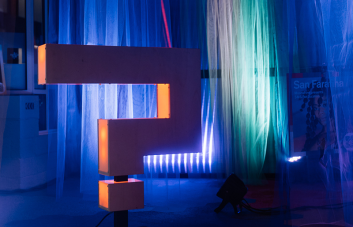“Even people who think we’re too commercial, which I don’t think we are at all, I say to them: what would you rather hear on the radio, “White Noise” or David Guetta? They can’t say anything back to that.” – Guy Lawrence, Disclosure
It was unsettling to many when Disclosure first appeared on the scene. Two years ago, in the Summer of 2011, the young brothers from Surrey released a free EP that introduced them to a bigger audience. In the title track and most popular song off the record, “Carnival”, the two brothers efficiently borrowed from the sounds the rest of the world referred to as the ‘UK sound’, as well as another slew of puzzling genre names (future garage, post-dubstep, bass music, etcetera). The EP was exemplary of the wave of bedroom producers who were listening to “Hyph Mngo” on single repeat for months at the time; the release sounded a little too familiar and rehashed. Fast forward two years later and the brothers Lawrence have taken the international charts by storm. Disclosure’s output has evolved from a bedroom cliche into the catchiest of dance floor orientated pop music. Their music is embraced by many listeners worldwide but there is still a big group of music pundits who not only think Disclosure’s music is still unsettling (to each their own) but also think that the brothers have no place in the charts. And this is where they’re wrong.
To go back to Guy Lawrence’s aforementioned quote, the difference in having a choice between David Guetta and Disclosure should not be a separation of good and bad. The subjective matter of taste is always going to be a never-ending debate. The real question here is, would you rather have generic music topping the charts that has been endlessly processed and ghost-written by oodles of musicians hired by major labels with profit as the only end goal? Or would you rather listen to the music of two regular guys who write their own tracks which happen to be highly accessible in the process? If we were to make a choice we’d pick the latter, and by no means would this be a forced option because if music is accessible and catchy, it doesn’t have to linearly compensate on quality. This is something that people often forget in such debates within house music, but make exceptions for in other genres. Where Disclosure singles are accused of being mind-numbing and saccharine, people are quicker to forgive musicians like Justin Timberlake, AlunaGeorge, Skream and Rick Ross for doing the same thing. There’s no harm in admitting all of them are good at what they’re intending to do.
The idea that Disclosure are a threat to music, whether we are talking about house or pop, is false. We can’t help but think of the whole brostep fiasco that occurred over the last two years. Skrillex came, saw and conquered the world while the misanthropist steppers were curled up in fetal position waiting for their beloved DMZ records to self destruct. This never happened. In fact, a lot of dubstep producers are still making good music and promoting great nights, whether they stuck with their original sounds or moved on to something else. If anything killed the old dubstep sounds that people were protective about, it was time: people gained great memories but were ready for something different. As it turns out, niche music fans have an irrational fear that their favourite music will be ruined by exposing it to a broader audience and the commotion that surrounds Disclosure is another example of this.
Many naysayers are quick to dismiss Disclosure as watered down house that’s been cleaned up with the sole purpose of catering to a larger audience. Ironically, most of such backlash originates from industry members that do exactly the same thing. The only difference is that usually the source of inspiration stems from genres that lie further away from what is generally familiar to us. In any case, what exactly is wrong with this so-called watering down of a sound? In reality, this watering down boils down to drawing from certain inspirations to create a new sound that is more accessible to a new audience. This is simply a natural progression of music. If Disclosure are wrong for paying homage to their house heroes, then the killjoys should be consistent and dismiss house innovators for reimagining the likes of Sugarhill Gang or The Supremes and dubstep producers for sampling the likes of Johnny Osbourne or even Alicia Keys. At this point, most genres originate as reinterpretations of another sound, and purists who constantly root for the safekeeping of genres are rooting against evolution of music. Throughout all of this we should remember that there’s no rules against being a proponent of both a genre and its evolved form. No one will kick up a fuss if you like both Ralph Tresvant and R. Kelly or Just Blaze and Hudson Mohawke, unless you count the pretense police.
If you want to judge Disclosure’s music in an honest way, separate their personalities from their records. Popular Disclosure denunciations are that they are not as scholarly about the history of music as producers that emerged from their scene are expected to be, and that they are ‘too young to be good producers’. Very often these two lines of reasoning exist in unison, but they are both groundless arguments. If you, for example, dislike Disclosure for supporting old school Detroit hip-hop or selecting Marcellus Pittman in their mixes because the Lawrence brothers are ‘too naive to understand that kind of music’, then that says more about your own attitude towards music than theirs. It is a frankly ridiculous belief that being present during the uprising of a certain genre is essential to understanding its music. In this case, Disclosure are simply spreading the word on music they love, and such background information is usually targeted at fans of their output. Unfortunately, it’s mostly those who oppose their music that harp on their quotes and interviews to point out once again what they’re doing wrong.
At this point, it seems as though Disclosure brings out a special breed of bitterness and hate in their opponents, where it borders hate for the sake of hating itself rather than solid and constructive criticisms of the duo. Where others are given a free pass, Disclosure are never cut the same amount of slack. In February of last year, Skrillex won three Grammys for his work and paid respects to the origins of dubstep by shouting out Croydon in his acceptance speech. Even opponents of his music couldn’t deny this humble and respectable move and gave the American musician his credit where it was due at the time. When Disclosure cite influences such as Kerri Chandler and Todd Edwards as defining artists to their sound, the guys saluting their roots gets nothing but backlash. It’s still unknown what warrants such undeviating opposition to Disclosure’s every move, but the fact that it is often hypocritical and erratic is certain.
If you think Disclosure have no distinctive musical identity, then you’re not paying enough attention. Their music might not be for you, but the argument that their discography is a ‘house music rip-off’ is past its prime. Because an artist isn’t an integral part of the origins of a scene itself doesn’t mean that they cannot draw inspiration from it, or make music that falls within that particular genre. During the period that the Lawrences have actively been putting out music, they defined a clear-cut sound that has their name written all over it. They might not be the first to use those polished stab chords, distinct vocal editing, and garage bass lines in their tracks, but they are definitely the only ones who successfully refine these different elements into a well-produced poppy sound that is theirs and finished to boot. Even though there have been other artists who tried to tackle the same atmosphere, Disclosure’s precision in handling it has been unprecedented. If you hand over a playlist consisting of fifty house tracks with two Disclosure tracks hidden in there to a person with the slightest bit of knowledge about dance music, they’ll be able to pick out the Disclosure tracks in there upon first listen.
It is a little discomforting that people still get upset over Disclosure topping charts and reaching the status of one of the most successful electronic music duos of the year. We live in an unprecedented musical era where artist and genre growth is exponential. Almost anything has become accessible. The borders between genres are blurring and it only makes sense that there is no particular defining sound of this era. This, ironically, defines our time and place. To lay the blame of such confusions on these two young artists in particular is excessive. It might be unsettling that we live in such a fragile time where things are constantly changing, which contrasts our past well-defined eras that we are used to in music. But rather than sitting in an immobile, paralyzed state of complaint, why don’t we embrace the openness of this and stop criticising every genre-crossing dynamic? We, for one, are more than ready for Disclosure’s debut album, and if it lives up to our expectations we hope it hits the Billboard album charts. One Nile Rodgers and one Jamie Woon can’t be wrong.
Stream: Disclosure – When A Fire Starts To Burn (PMR Records)
Written by: Soraya Brouwer & Sindhuja Shyam.




Very interesting to read this after Blackdown’s post last week. Well done Truants
http://blackdownsoundboy.blogspot.co.uk/2013/05/dear-disclosure-i-wanna-bet.html
Thanks Andrew! That was the article that got the two of us talking about Disclosure and inspired this post.
thank you :)
an excellently written article. exactly my thoughts.
Thank you!
Thanks for the kind words!
So taste is subjective, but the quality of Disclosure’s music isn’t? Your final assertion that two successful musicians MUST be correct in their praise of another act is laughable. While I absolutely love Hudson Mohawke, I’m not going to support or enjoy Disclosure just because he remixed one of their tracks.
All I got from “When A Fire Starts To Burn” is that Disclosure use vocal samples in the same way brostep uses wobbles, and that they can’t (or refuse) to go beyond the stock house rhythms which at this point are turgid and lazy. It’s simply boring music.
In the paragraph I think you are referring to, we are simply trying to explain why we think their music works in the context of pop, whether you enjoy their tracks or not is a personal choice. Also, the last sentence was supposed to be tongue-in-cheek. I should’ve added an emoji or two to clear that up.
A fair case, though after reading the guardian interview I’m not really sure where they’re going with the comment about their music making girls ‘pleased that there’s some joy back in club music’ as if we can’t deal with anything less sugary than their own stuff. Nah.
A questionable comment indeed but there are plenty of producers who have made very questionable comments regarding women in the club and get away with it because they are more “respected” if you will and people aren’t as quick to express their oppositions towards them. In general I think Disclosure get a special breed of hate like I mentioned before where others get a free pass. This isn’t an excuse btw, but we should be more uniform with opposing such comments IMO.
great read, someone has to stand up for these boys, honestly who gives a fuck about them so much to be such harsh critics it’s silly, most of the people slagging them off make shit music anyway
Thanks, glad you enjoyed the read.
I’m arguing with my boyfriend about this. I agree with this article and he’s citing Blackdown’s article. shut up mann.